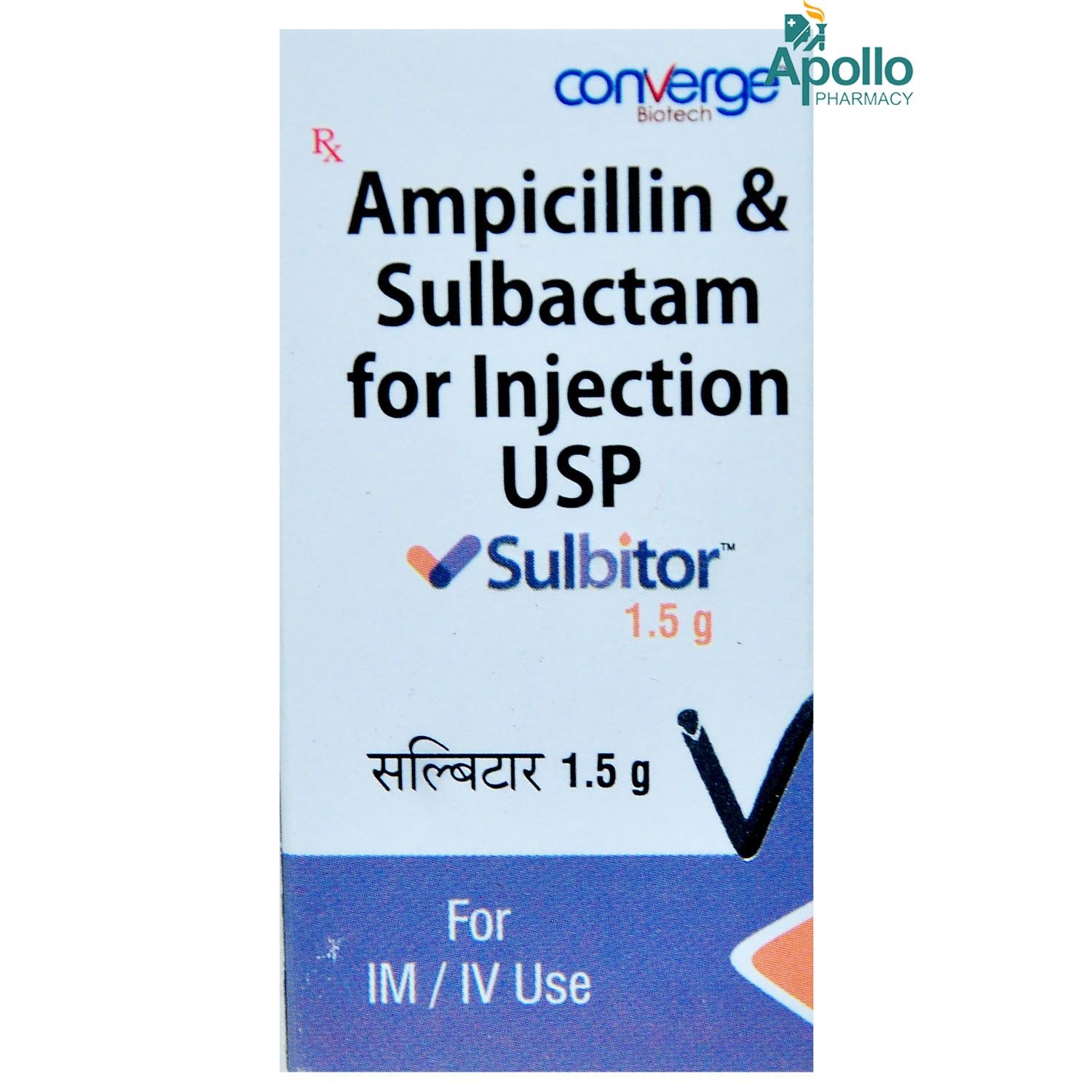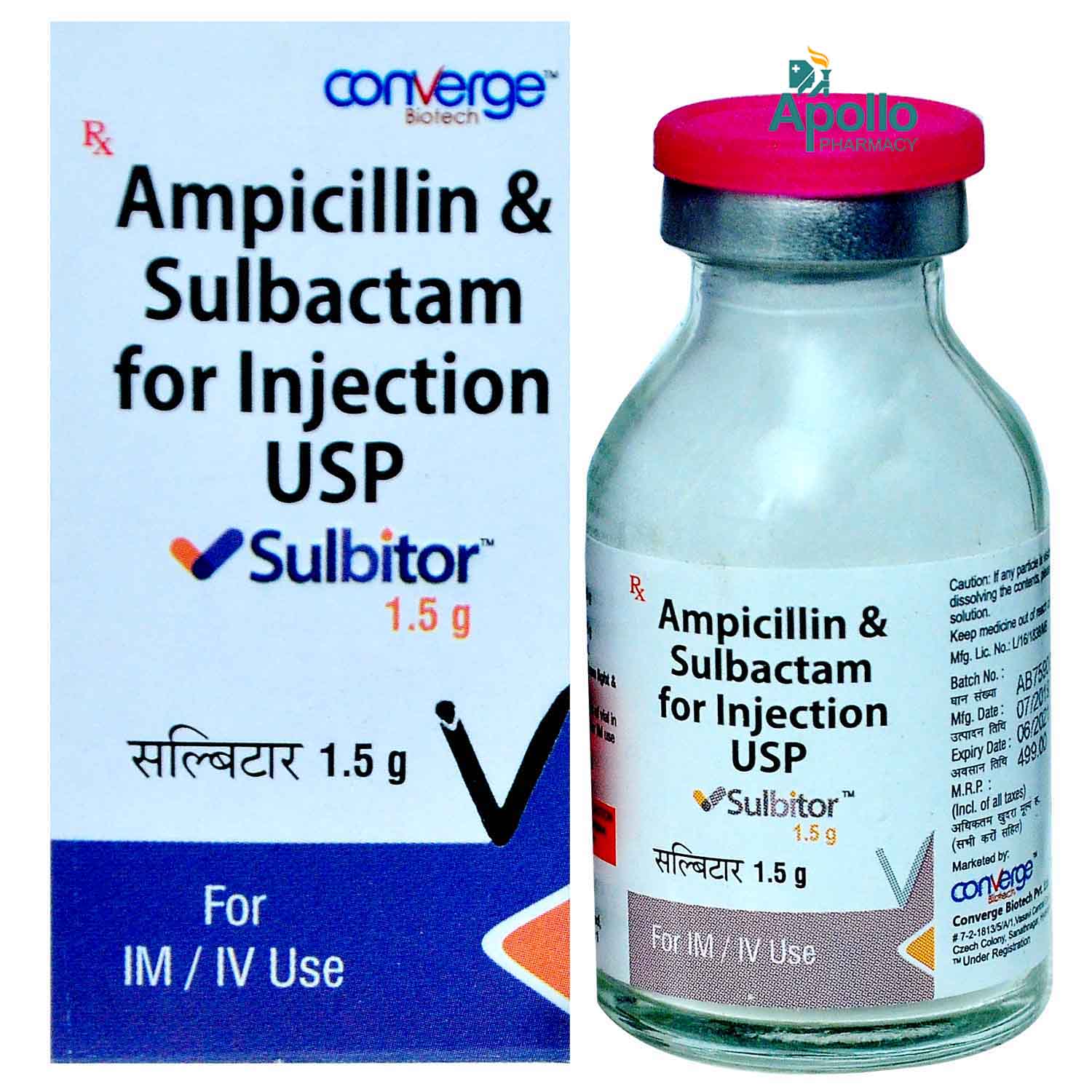Sulbitor 1.5gm Injection
MRP ₹565
(Inclusive of all Taxes)
₹84.8 Cashback (15%)
Provide Delivery Location
Online payment accepted
 Prescription drug
Prescription drugWhats That
Composition :
Manufacturer/Marketer :
Consume Type :
Expires on or after :
Return Policy :
About Sulbitor 1.5gm Injection
Sulbitor 1.5gm Injection belongs to a class of drugs called antibiotics used to treat several types of bacterial infections, including infections of the urinary tract, upper and lower respiratory tract, ears, nose, throat, chest, lungs, soft tissue, skin, bone and joint, intra-abdominal and gonococcal infections. A bacterial infection is a condition in which harmful bacteria grow in the body and cause infection. It can infect any part of the body and multiply very quickly. Sulbitor 1.5gm Injection does not work against infections caused by the virus.
Sulbitor 1.5gm Injection contains two antibiotics, Ampicillin (penicillin antibiotic) and Sulbactam (beta-lactamase inhibitor). Ampicillin works by interfering with the formation of the bacterial cell wall (a protective covering) that is necessary for their survival. It damages the bacterial cell wall and kills bacteria. Sulbactam works by blocking beta-lactamase, an enzyme produced by bacteria to inactivate antibiotics. Thus, it prevents bacteria from destroying Ampicillin.
Sulbitor 1.5gm Injection will be administered by a healthcare professional; do not self-administer. Sometimes, Sulbitor 1.5gm Injection may cause common side effects such as pain at the injection site, diarrhoea, nausea or vomiting. Most of these side effects of Sulbitor 1.5gm Injection do not require medical attention and gradually resolve over time. However, if the side effects persist or worsen, please consult your doctor.
Please tell your doctor if you are allergic to Ampicillin, Sulbactam, cephalosporin antibiotics, penicillin antibiotics, or any other medicines. If you are pregnant or breastfeeding, please inform your doctor before receiving Sulbitor 1.5gm Injection. Ampicillin may reduce the effectiveness of birth control pills. Therefore, discuss with your doctor about other contraceptive methods to avoid pregnancy while on treatment with Sulbitor 1.5gm Injection. If you have or have ever had liver disease, especially after using a penicillin antibiotic, inform your doctor before receiving Sulbitor 1.5gm Injection.
Uses of Sulbitor 1.5gm Injection
Directions for Use
Key Benefits
Sulbitor 1.5gm Injection is a combination of two antibiotics: Ampicillin and Sulbactam, used to treat several bacterial infections. Sulbitor 1.5gm Injection has a broad spectrum of antibacterial activity that acts against aerobic (grow in the presence of oxygen) and anaerobic (grow in the absence of oxygen) gram-negative and gram-positive bacteria. Ampicillin interferes with the formation of the bacterial cell wall (a protective covering) that is necessary for their survival. It damages the bacterial cell wall and kills bacteria. Sulbactam blocks beta-lactamase, an enzyme produced by bacteria to inactivate antibiotics. Thus, it prevents bacteria from destroying Ampicillin.
Storage
Drug Warnings
Please tell your doctor if you are allergic to ampicillin, sulbactam, cephalosporin antibiotics, penicillin antibiotics, or any other medicines. If you are pregnant or breastfeeding, please inform your doctor before receiving Sulbitor 1.5gm Injection. Ampicillin may reduce the effectiveness of birth control pills. Therefore, discuss with your doctor about other contraceptive methods to avoid pregnancy while on treatment with Sulbitor 1.5gm Injection. If you have or have ever had liver disease, especially after using a penicillin antibiotic, inform your doctor before receiving Sulbitor 1.5gm Injection. Sulbitor 1.5gm Injection may interact with specific tests such as glucose (sugar) in urine and give false positive results. Therefore, inform the doctor that you are on treatment with Sulbitor 1.5gm Injection before undergoing any tests.
Drug-Drug Interactions
Drug-Drug Interactions
Login/Sign Up
When BCG vaccine is used with Sulbitor 1.5gm Injection, its effectiveness may be reduced.
How to manage the interaction:
Taking Sulbitor 1.5gm Injection with BCG vaccine can lead to an interaction, please consult a doctor before taking it. Do not discontinue the medication without consulting a doctor.
Co-administration of Methotrexate with Sulbitor 1.5gm Injection can increase the levels and side effects of Methotrexate.
How to manage the interaction:
Although there is a possible interaction between methotrexate and Sulbitor 1.5gm Injection, you can take these medicines together if prescribed by your doctor. However, if you experience any symptoms such as tiredness, dizziness, fainting, unusual bleeding or bruising, chills, fever, sore throat, body pains. Consult a doctor immediately. Do not stop using medications without a doctor's advice.
Co-administration of Sulbitor 1.5gm Injection with Cholera, live attenuated together may reduce the activity of the vaccine.
How to manage the interaction:
If you are currently being treated with Sulbitor 1.5gm Injection or have been treated within the last 14 days, talk to your doctor before receiving cholera vaccine, live. Do not discontinue the medication without consulting a doctor.
Drug-Food Interactions
Drug-Food Interactions
Login/Sign Up
Diet & Lifestyle Advise
- Take probiotics after completing the full course of Sulbitor 1.5gm Injection to restore some healthy bacteria in the intestines that may have been killed. Taking probiotics after antibiotic treatment can reduce the risk of antibiotic-associated diarrhoea. Certain fermented foods like cheese, yoghurt, kombucha, sauerkraut, and kimchi can help restore the intestine's good bacteria.
- Include fibre-rich foods, as they can be easily digested by your gut bacteria, which helps stimulate their growth. Thus, fibre-rich foods may help restore healthy gut bacteria after a course of antibiotics. Whole grains such as whole-grain bread and brown rice should be included in your diet.
- Make sure you drink plenty of water or other fluids daily while you are receiving Sulbitor 1.5gm Injection.
- Avoid alcohol consumption as it may increase adverse effects.
Side Effects of Sulbitor 1.5gm Injection
- Pain at the injection site
- Diarrhoea
- Nausea
- Vomiting
Habit Forming
Therapeutic Class
All Substitutes & Brand Comparisons
RX
Out of StockAmpidac 1000mg/500mg Injection
Innovative Pharmaceuticals Pvt Ltd
₹145
(₹13.05/ 1ml)
97% CHEAPERRX
Out of StockAmpitum 1000 mg/500 mg Injection
FDC Ltd
₹96
(₹17.28/ 1ml)
96% CHEAPERRX
Out of StockAmpy S 1000mg/500mg Injection
₹78
(₹70.2 per unit)
86% CHEAPER
Author Details
We provide you with authentic, trustworthy and relevant information
Drug-Diseases Interactions
Drug-Diseases Interactions
Login/Sign Up
FAQs
Drug-Drug Interactions Checker List
- PROBENECID
- ALLOPURINOL
- METHOTREXATE
- ERYTHROMYCIN
- CHLORAMPHENICOL
Special Advise
- If you are about to undergo any urine tests, inform your doctor or lab technician that you are on treatment with Sulbitor 1.5gm Injection as it may interfere with these tests giving false positive results.
Disease/Condition Glossary
Bacterial infection: It is a condition in which harmful bacteria grow in the body and causes infection. It can target any part of the body and multiply very quickly. Bacteria come in three basic shapes: spherical, rod, or spiral-shaped. Bacteria may be gram-positive (have thick cell walls) or gram-negative (do not have cell walls). Appropriate tests are done to identify bacterial strains, and based on the results, proper medication is prescribed. Some common symptoms of bacterial infection include cough, fever, and tiredness.

Have a query?
Alcohol
Safe if prescribed
The interaction of Sulbitor 1.5gm Injection with alcohol is unknown. If you have any concerns, please discuss them with your doctor.
Pregnancy
Consult your doctor
Limited data is available on the effect of Sulbitor 1.5gm Injection in pregnancy. Hence, if you are pregnant or planning for pregnancy, inform your doctor before receiving Sulbitor 1.5gm Injection. Your doctor may prescribe this medicine only if clearly needed.
Breast Feeding
Consult your doctor
Low concentrations of Sulbitor 1.5gm Injection may be excreted in breast milk. Therefore, Sulbitor 1.5gm Injection should be used with caution if you are breastfeeding.
Driving
Safe if prescribed
It is unknown whether Sulbitor 1.5gm Injection affects your ability to drive. However, avoid driving if you experience any symptoms affecting your driving ability.
Liver
Consult your doctor
If you have a pre-existing or a history of liver disease, inform your doctor before receiving Sulbitor 1.5gm Injection. Your doctor may adjust the dose of this medicine or prescribe a suitable alternative based on your condition.
Kidney
Consult your doctor
If you have a pre-existing or a history of kidney diseases, inform your doctor before receiving Sulbitor 1.5gm Injection. Your doctor may adjust the dose of this medicine or prescribe a suitable alternative based on your condition.
Children
Safe if prescribed
The safety and effectiveness of Sulbitor 1.5gm Injection in children aged one year and above have been established. However, it is administered by a doctor or nurse.













